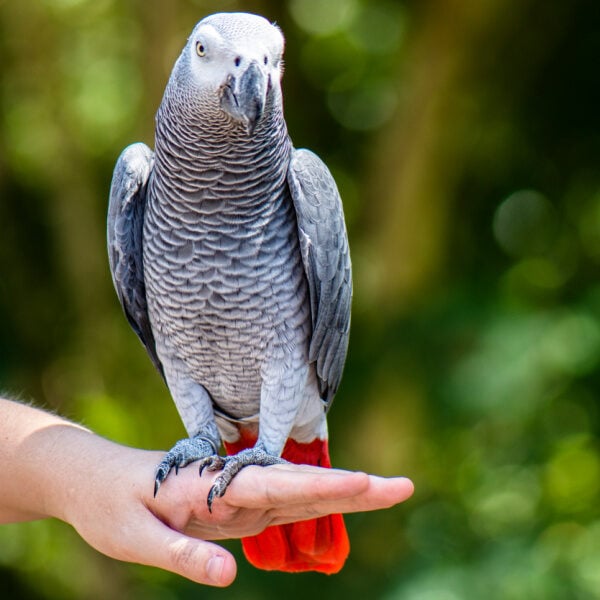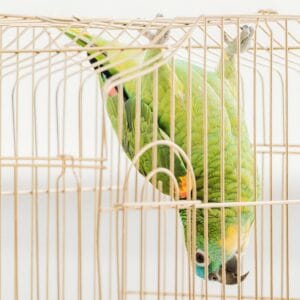Last Updated on by Mitch Rezman
When you are not with your bird, what quality of life do you provide it?
I’m lucky, I work from home and can spend more time with my birds than most people, but I also find that Mango, my tame, trusting conure, doesn’t want to be with me all the time.
And I have a rehomed budgie, Kiwi, that isn’t trusting due to his early life and Mango is teaching him how to be a bird at two years of age, things he should have been taught as a just weaned baby.
When I got Kiwi, I was told he had been tame but I found he didn’t trust anyone or anything and as far as I can learn, he was in a tiny cage with one hanging toy and two perches. In other words, he hadn’t had enough to interact with to learn to be a bird. He survived, but that’s about it.

Best Bird Friends come in all shapes and sizes
Suddenly he found himself with a large cage with lots of perches of all sizes and quite a few toys. He was totally intimidated, looked at Mango and his cage and his perches and toys. Mango knew what to do with things so Kiwi dared to enter Mango’s domain and, I guess realizing the lack of development in Kiwi, Mango tolerated this intrusion. Kiwi has watched and after a few days dared to test a piece of apple Mango was eating. Why he took food from Mango’s mouth (not removing it but biting the other end) rather than test a piece in his own food dish is beyond me. But now he eats whatever he sees Mango eating except the larger seed and nuts Mango eats. Kiwi has his own appropriate food and all the fruits, veggies, pasta, and other healthy nibbles Mango gets but in smaller pieces.
It was over a month of watching Mango bathe before Kiwi dared to try that. I had tried spraying him but he didn’t seem to like it at all. I got a shallow dish in his size to put beside Mango’s larger bath dish. Now they both splash when they want to, often at the same time. Just last week I caught them sitting together on a perch, so they are clearly bonding.
Once in a while fur replaces feathers for friendship
Kiwi may never become really tame, especially if he was mistreated in the past. I tried to contact his former owners to learn more about his past, but they never called back. I guess they didn’t want to tell me anymore information; perhaps they knew his life had not been full. Well, it is now.
Think about your companion bird and the time you are away from him or her. If you work outside the home, you probably get up, feed and clean, and spend as much time as you can with your bird before leaving for work, but how long is that really? A half hour? Less? And then, with commute time, you are away 8-12 hours and that’s if you aren’t working overtime. Part of the year days are short and your bird is in bed when you finally come home. Even if you work part time or don’t work outside the home but have to clean, shop, care for children, and live life, how much time does your bird have to entertain itself?
Does your bird’s house provide an environment that is large enough and varied enough to give the bird something to do with all those hours? Sure, birds wake up, poop and eat, but then they play a while before that first nap time. They repeat this cycle all day long. But they are only having fun if are things that are fulfilling and fun to do.
Birds love puzzles, especially the large parrots. Do you provide foraging or puzzle toys for your bird? Does he have problems to solve and think about? Are they toys to swing and climb on? Does he have plenty of chewing opportunities? Are his food choices interesting and served in interesting ways like kebobs? Are there perches of various types, sizes and textures? Does he have a place to hide and feel safe when he naps or goes to sleep at night? Does he have the chance to bathe when he wants? Is his cage big enough to fully stretch his wings and still turn around and move freely?
If the answer to any of these questions – and I could think of many more – is “no” then you are not providing enough quality of life for your bird when you are not directly interacting with him or her. Even if you have all these things and never change them out for new choices or move them around, he’ll still get bored with his home. At least once a month, add a new toy or two and move several others around, perhaps leaving his most favorite in place all the time. If he sleeps in a bed, don’t move his bed that is sacred to him.
Time is elastic to birds. We are out rushing around at today’s society’s fast pace while your companion parrot sits home and just waits. Time passes for him like it did for you when you were a child. Remember when waiting for Christmas took forever, with the period from Thanksgiving to Christmas school break being soooo incredibly long? That is much more the pace at which your parrot’s time passes. They don’t rush, ever, except when they see a treat coming; then they rush to grab a high-value treat. Otherwise, time moves slowly for birds.
Bird’s Best Freind?
A parrot that doesn’t have things to keep busy with ends up experiencing time at an even slower pace. In the wild, parrots wake up, poop, forage for food (not just going to a full cup), perhaps traveling far away to reach the food they need, rest, continue the task of finding food, socialize with their flock and locate a mate to reproduce with. Their days are filled. You need to consider this when designing your bird’s environment. A cage isn’t enough – they need an environment to live in.
You don’t want to get the cage so cluttered that the bird can’t move without knocking itself with objects, but it still needs lots of things to play with, especially if another parrot isn’t in the home that it interacts with while you are away.
Be creative; make toys from pieces you can buy so that you can change those pieces around into new toys. These pieces can be one toy one month and create something entirely different and fun the next month.
Be sure to buy objects for interaction in the right size for your parrot. Consider your bird’s personality and introduce new toys slowly if you have a timid parrot. Sometimes it takes two weeks for a parrot to accept some new toys but don’t give up, the bird will get curious once it sees the object won’t eat it for lunch.
Mango is especially leery of new objects. While he took to his new bed, he also go a new swing with lots of sisal and hemp strings on it in various colors and a bell on bottom. He is still in the stage of watching it on top of his cage. Once I see him touch it – I play with it every day in front of him to show him it is safe — he’ll soon decide to check it out and then I can hang it in his cage and he’ll play with it for hours and likely Kiwi will insist on time on it also.
Kiwi got a new swing that replaces an old chewed one he’d been playing on. He thought that was just fine after only a day. But it was much like his old perch, just not customized to near breaking by Mango’s beak. The two birds shared the old perch but Mango, being the leery one of the two, let Kiwi test drive the new swing a few days before trying it out. I realize that the time Mango spends watching and thinking about the new toys does add to his life because it makes him use his brain, just as toys do.
I finally realized Kiwi didn’t want a big cage of his own, so now they sit side by side and both bird go back and forth from cage to cage, doubling their environment. And yes, doubling my space to clean, but it’s worth it.
Thankfully my friend got a new Dyson vacuum and passed his lightweight Shark to me, so cleaning up the seed is fast and easy. But I still have to change the floor protector and mop in places I never reached before as well as wipe up poop from all over the place, but that too is worth it to create a place where I can go away for a few days and know that even though Kevin may by working 8 or 9 hours, the birds will still be happy and live a good quality of life.
I had to be gone for a few months a while back and Kevin had to work 6 days a week, overtime every day. Mango got bored due to lack of changes and human time. There is now a 3 foot by 3 foot hole in the drywall where he opened the wall out of boredom behind the window curtain. When he had quality of life through changes, new toys, and some quality human time every day, he isn’t tempted to be destructive like that. It wasn’t a nest; he never wanted to go inside. It was just an activity to keep busy. My problem now is that Kevin has always been a drywall worker and, as every mechanic or handyman’s wife knows, the home car or the house gets fixed last, so the hole remains. I’ll probably fix it myself one day when I decide to change to shorter curtains. That will give the birds something interesting to watch! I’ll have to buy new toys again then so they don’t decide to re-customize the house after watching me get on my hands and knees and fix the hole.
Here’s an aside everyone should know, especially if you live alone with your birds: What if something happens to you while you are away from home? Do you have a contact in your cell phone listed as ICE (it stands for In Case of Emergency) followed by the person’s name and every possible number they could be reached through listed? It should be someone that can make decisions for you and know to go into your house and care for your birds. If you are in an accident and can’t respond, all First Responders are taught to look for your cell phone, open contacts and search for ICE, calling the person you want to be contacted. You can have ICE2 or even ICE3 if you want. They’ll try to reach them in order. Since you own birds, chose people who either know where you have a key to your home or give them one because if you were in the hospital in a coma, you don’t want your birds to suffer. Too few people know this, so pass it along to your non-bird owner friends so they will use this in their phones too.
Author Profile

Latest entries
 Bird & Parrot CareJune 20, 2025Understanding the Best Way to Use Prevue Pets Mimic Me Voice Trainer
Bird & Parrot CareJune 20, 2025Understanding the Best Way to Use Prevue Pets Mimic Me Voice Trainer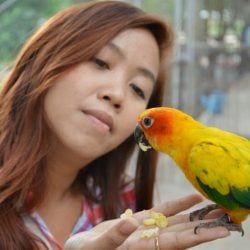 Bird BehaviorJune 6, 2025How Do I Keep My Parrot From Dumping His Food Every Day?
Bird BehaviorJune 6, 2025How Do I Keep My Parrot From Dumping His Food Every Day?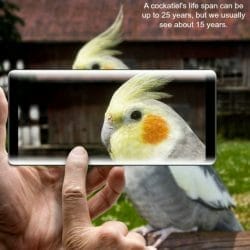 Birds & LightingMay 16, 2025I Am Seeking Clarity About Lighting for My Birds Cage
Birds & LightingMay 16, 2025I Am Seeking Clarity About Lighting for My Birds Cage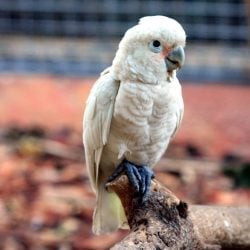 Bird RescueApril 29, 2025How Do We Re-Home a 17 yr Goffin Cockatoo?
Bird RescueApril 29, 2025How Do We Re-Home a 17 yr Goffin Cockatoo?


